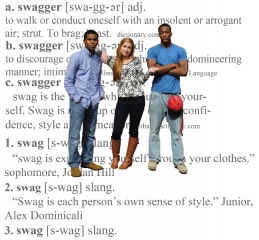By ISABELLA ZACCARIA-JEFFERS – Viewpoints Writer
While the word “swag” means one thing to Clarke Central High School students, its derivative “swagger” has negative origins.
While walking down a hall in Clarke Central High school, I was once told by a group of students that I was “swagged out.”
The word “swag” is commonly heard on Clarke Central High School’s campus, but the meaning varies from student to student. “Swag” derives from the word “swagger,” which, unbeknownst to many CCHS students, has negative connotations. Graphic by Dylan Reeves.
Not knowing what to think of the comment, I just smiled and continued walking. I’ve heard that phrase before, along with others such as, “Look at my swagger,” “I be swagging to the max” and even, “my swag on the money.”
So just what is “swag?”
With some quick research, I soon realized that swag, derived from the word “swagger,” is not a new term invented by the CCHS student body.
Dictionary.com defines swagger as “to walk or conduct oneself with an insolent or arrogant air. To brag; boast.”
Collins Thesaurus of the English Language regards swagger as “to discourage or frighten with threats or a domineering manner; intimidate.”
I am not so sure I want to be referred to as “swagging to the max” anymore.
Searching a little further and in a more relevant database, I found the following definition, according to urbandictionary.com: “Swag is the way in which you carry yourself. Swag is made up of your overall confidence, style and demeanor.”
OK, I guess at least in the confines of CCHS I feel a little better about myself now.
So how does a term properly used in a negative fashion transform into something seemingly good and even flattering?
Swag, I suppose, is following the same path as other words that have a different literal definition from the way the word is used in everyday language.
In a world where many make a living in communicating, advertising and marketing, it is important to have clarity in your message.
Using terms you don’t know the original definition to can be rather risky. You may end up saying something you didn’t intend to say. It is important to recognize the terms you use, and how you are using them. It’s common for students to take words they have heard their favorite rappers or role models use, and begin applying it to their own context.
Think about words we use everyday such as bad or cool, or phrases such as “I’m down with that” for example. Bad is now good, cool is no longer a temperature reading and I’m down with that is not down at all, but rather an agreement.
Throughout time, words will change their meanings– it’s a fact. The use of slang words has become more and more frequent. We use them so often that many times we forget the original meaning of the term.
Swag is just another one of those words. The students of CCHS apply it to almost all of their daily conversations, myself included.
Swag is used frequently enough for most of CCHS students to recognize it as meaning the same thing. However, what a word means to us may not have the same definition to others outside the school community.
So, before you go around using words you’ve heard, take a step back and think before you speak.
More from Isabella Zaccaria-Jeffers

